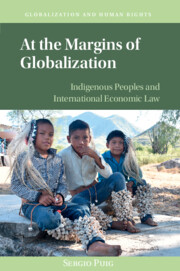Book contents
- At the Margins of Globalization
- Globalization and Human Rights
- At the Margins of Globalization
- Copyright page
- Dedication
- Contents
- Tables
- Preface and Acknowledgments
- Introduction
- 1 Globalization and Its Multiple Discontents
- 2 The Process of Susceptibility and Exclusion
- 3 Indigenous Peoples under International Economic Law
- 4 The Experience of Indigenous Peoples under Economic Regimes
- 5 The Recalibration of Indigenous Rights and Economic Law
- 6 Indigenous Interests and the Future of Economic Treaties
- 7 Toward an Indigenous-Based Critique of Globalization
- Conclusion
- Index
- Series page
7 - Toward an Indigenous-Based Critique of Globalization
Published online by Cambridge University Press: 23 April 2021
- At the Margins of Globalization
- Globalization and Human Rights
- At the Margins of Globalization
- Copyright page
- Dedication
- Contents
- Tables
- Preface and Acknowledgments
- Introduction
- 1 Globalization and Its Multiple Discontents
- 2 The Process of Susceptibility and Exclusion
- 3 Indigenous Peoples under International Economic Law
- 4 The Experience of Indigenous Peoples under Economic Regimes
- 5 The Recalibration of Indigenous Rights and Economic Law
- 6 Indigenous Interests and the Future of Economic Treaties
- 7 Toward an Indigenous-Based Critique of Globalization
- Conclusion
- Index
- Series page
Summary
The intersection between indigenous rights and international economic law serves as an instructive lens of the complex interactions between human and economic-focused areas of international law. Specifically, it uncovers how two fields with distinct goals, rules and structures are implicated in the way globalization both affects and tries to protect marginalized communities. Since both fields can also complement each other to improve the situation of almost one billion marginalized indigenous peoples, international economic law can incorporate the struggle for social inclusion espoused by human rights law as it relates to indigenous peoples, as argued in Chapter 6. This final chapter briefly provides first, a reflection on how to rethink the failure of globalization with indigenous peoples in mind. It further outlines the normative underpinnings of an inclusive globalization that can provide more hope for those marginalized by the current structure created by international economic law.
- Type
- Chapter
- Information
- At the Margins of GlobalizationIndigenous Peoples and International Economic Law, pp. 141 - 147Publisher: Cambridge University PressPrint publication year: 2021

